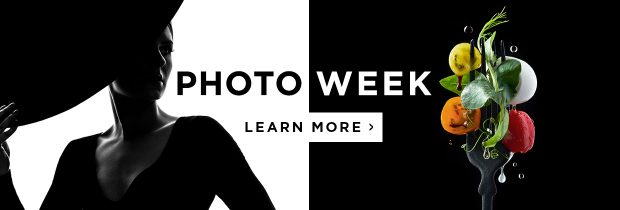Bridging The Gap
One of the best, and most frustrating, things about photography is how much there is to learn. It would be enough if photographers just had to master the technical aspects of your camera, posing, marketing, lighting, rules of composition, editing and color theory to be successful. But, photographers must also deal with ever-changing advances in gear, printing techniques, and even changing environments in which they are expected to shoot well.
Is all of this overwhelming? Sure. But taking the time to reflect upon where your work needs improvement and bridging the gap in your knowledge will get you where you want to be. Being open to learning new skills and techniques, along with some practice, can even get you there quickly.
It’s here! Photo Week 2017 is LIVE AND FREE right now. Join us this week for our theme of Bridging the gap with 20 world renowned instructors and 40 incredible courses. Learn More here.
Many photographers look at their work and know there is room for improvement but may not be sure how to go about gaining the skills to elevate their images to where they would like them to be. As a result, they stagnate, missing out on both business and artistic possibilities and possibly becoming bored with their craft.

Photo by Scott Frances
The first step towards bridging the gap, and creating better images, is to look at your images critically. Pick apart even the images you love, and figure out what you could have done better. Maybe the families you photograph look a little more awkward than you would like. Maybe your images look great on screen but don’t look as great hanging on the wall. Maybe you want to learn how to make your own backdrops, shoot at night, learn macro, or create composites but you don’t know how to get started.

Photo by Scott Frances
During Photo Week 2017, CreativeLive will be focusing on helping both new and experienced photographers bridge the gap in their knowledge to help them create the images they envisioned making when they first picked up their cameras. PhotoWeek classes will focus on key areas in which bridging the gap in a photographer’s knowledge will have a big impact in a short amount of time.
Some of the areas that PhotoWeek will cover are:
Editing: It can take years to master all of the features Adobe Photoshop and other editing programs pack in. Photo Week classes will cover several editing topics many photographers have always wanted to learn, from advanced retouching techniques to composites. There are also classes covering how you can use techniques you are probably already using, like burning and dodging, for greater impact in your photos. Bridging the gap in your editing knowledge can help you make images that match your vision.
Posing: When it comes to photographing people, finding a great location and knowing how to expose your photographs perfectly often isn’t enough to create a great image. Most people don’t know how to “look natural” in front of the camera or give you a great, emotive expression on command. There are several Photo Week classes that can help, ranging from posing for lifestyle photography to body language in portraits to posing large groups to posing for headshots and even athletic portraits. Posing can even be used to help you make stronger compositions. Bridging the gap in posing will give you greater control over how your subjects look, and feel, in front of your camera and consequently help you make stronger portraits and lifestyle images.


Photos by Ben Hartley
Lighting: Lighting is key to making good photographs with the mood you want to create. But, there is no one right way to light a photo, ranging from all natural light to a bank of studio lights to keeping it simple with a flash. Yet, every situation requires a different approach to bring your vision to life whether it’s making gorgeous landscape photos, photographing buildings, making portraits at night, or finding the best way to light families. Photo Week will have classes covering all of these scenarios and more. Bridging the gap in your lighting knowledge will help ensure that your photos are lit the way you want them to be every time and that you can create the feeling you want using light in your images every time in every scenario.

Photo by Alexis Cuarezma
It’s here! Photo Week 2017 is LIVE AND FREE right now.Join us this week for our theme of Bridging the gap with 20 world renowned instructors and 40 incredible courses. Learn More here.
Business Skills: Even the most technically proficient photographers won’t be successful if their business skills are lacking. Photo Week classes will help you bridge the gap in your business knowledge by covering everything from how to create an impactful portfolio to showcase your work, to the contracts you need to protect yourself, to the marketing skills you need to get your name in front of your ideal clients. Bridging the gap in your business skills is essential to ensuring your business will thrive and you make a living doing what you love.
Printing: Some photographers shoot solely for web use, but most want to see their images hanging on walls or printed in photobooks. Yet, many photographers lack the know-how of how to prepare their images to print their best. Check out Photo Week classes on color management for great prints and fundamentals for great prints to bridge the gap in your knowledge to make prints you and your clients will love to look at for years to come.
Landscapes and Travel: Many photographers spend years developing the skills they need to be successful close to home, but find they are not as skilled at making great images of landscapes or telling the story of their travels. Photo Week classes will help you bridge the gap in your knowledge by examining how to capture scenic views and landscapes, how to ensure the story of a trip is told well, and how to develop the best post-processing techniques.

Photo by Chris Knight
Tying it All Together: We already know there is a lot that goes into making a successful image. Photo Week will offer several critique sessions and a shoot-out with some favorite CreativeLive instructors so you can see how all of this knowledge translates into the real world. Bridging the gap in your knowledge by learning from others photographer’s mistakes and challenges will help you be able to look at you own work critically and face challenges head-on.
Check out the full listing of Photo Week classes and the full schedule here and plan how you will use Photo Week to bridge the gaps in your photographic knowledge.
It’s here! Photo Week 2017 is LIVE AND FREE right now. Join us this week for our theme of Bridging the gap with 20 world renowned instructors and 40 incredible courses. Learn More here.



